In 1991 I heard
about an independence movement in a country called Yugoslavia. I didn't
know much about it. It was a place known for the Olympics, and the
assassination of a prince there had started World War I. It was
interesting that Yugoslavia was one of the last countries left over
from the cold war that had not gone through a major political change. I
thought the rhetoric coming out of there had an evil nationalistic
tone.
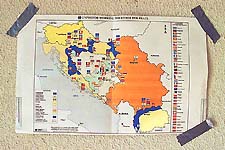
The fall of the Berlin wall and subsequent collapse of the Soviet Union
had led people to believe that the world had taken a turn towards
peace. All that wound up happening in places such as Yugoslavia was
the lifting of a lid on fervent nationalistic feelings.
I decided to go. My decision was reaffirmed by the quick announcement
of the independence of Slovenia, one of the republics.
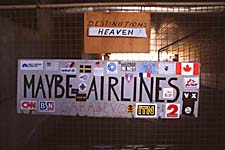 I left that night. By the next day it was evident that independence wasn't going to
be easy. The Yugoslav Federal Army, with bases in Slovenia, was going
to fight the decision to break up Yugoslavia.
I left that night. By the next day it was evident that independence wasn't going to
be easy. The Yugoslav Federal Army, with bases in Slovenia, was going
to fight the decision to break up Yugoslavia.
I arrived in Zagreb, capital of the Croatian Republic. The only way to
get to the fighting was by train. The train was filled with anxious
and nervous people. I was one of them. I struck up a conversation with
a woman sitting in the same car. She was nearly in tears. I said I was
a journalist and was going to photograph the independence movement. She
looked up at me and said, "This is just the beginning, first Slovenia,
then Croatia and Bosnia. Yugoslavia is finished."
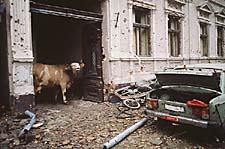 I
replied that she shouldn't worry; there won't be a war in the middle of Europe. My
naive answer was to haunt me in the years to come.
I
replied that she shouldn't worry; there won't be a war in the middle of Europe. My
naive answer was to haunt me in the years to come.
I heard diplomat after diplomat state the same sentiment. European
diplomats happily left the local airport, champagne glasses in hand,
after negotiating a diplomatic settlement. Moments after their plane
left; the airport and city were bombed by the Yugoslav Air Force. Thus
set in motion a pattern that would continue time and again. This was
my welcome to the Balkans.
With Slovenia now independent the movement turned to Croatia and
Bosnia. Croatians valiantly struggled to set up local defense forces
against the Yugoslav Army. Units were formed and camouflage camping
uniforms were bought at local stores. I worked with defense forces
made up of local villagers. In the beginning it was a hunting rifle
against machine guns and tanks.
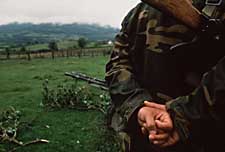 Serious warfare
ensued. Planes began to attack small villages, and tanks lay siege to towns for months.
The practice of ethnic cleansing was started. Each side was determined
to purify the area. Refugees began to number in the thousands.
Serious warfare
ensued. Planes began to attack small villages, and tanks lay siege to towns for months.
The practice of ethnic cleansing was started. Each side was determined
to purify the area. Refugees began to number in the thousands.
In the beginning it was difficult to convince editors in New York that
the war was serious. I thought Americans should be interested in the
conflict. Yugoslavia was no longer just the place of the 1984 Olympics.
Yugoslavia was a cancer in the heart of Europe.
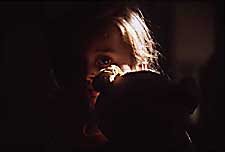 I would work for several weeks, take a break, and then return again.
I would work for several weeks, take a break, and then return again.
As the war progressed and spread into Bosnia, the level of violence
increased. The stakes became higher for those involved. The world
community half heartedly put its reputation on the line. It did more
damage than good. It became difficult to justify my role as a
journalist. I had photographed the first ethnic cleansing of the
Bosnian war. Innocent civilians executed by well-armed paramilitary
forces.
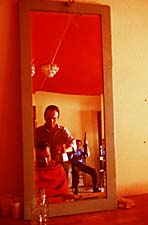 The pictures were published and
there was no reaction from the politicians. I know that photographs cannot change the world by
themselves. But I felt that the world community had truly failed.
The pictures were published and
there was no reaction from the politicians. I know that photographs cannot change the world by
themselves. But I felt that the world community had truly failed.
I saw how the first battle started with the townspeople fueled by
nationalistic leaders. The war progressed from barber against butcher
to commando unit against innocent civilian and finally evolved into
tank against tank. I would travel and photograph the different sides.
By spending time with the soldiers I wanted to show the world what it
was like there. Then I would be able to explain the differences of
these people. In the end I realized that they were the same people.
manipulated for power and greed.
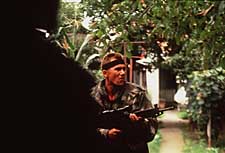 In the beginning of the war all sides saw journalists as fair and
impartial tellers of their story. As the war continued, the warring
factions began to realize that their story would not be the only one
told. The war had become quite dangerous. In the first six months over
30 journalists were killed. We went from being welcome to being
targets. More often than not my day would include at least one arrest
from varying sides determined to have you tell their story. It went
even further once when I was accused of being a spy. I was
interrogated and beaten for several days before my release.
In the beginning of the war all sides saw journalists as fair and
impartial tellers of their story. As the war continued, the warring
factions began to realize that their story would not be the only one
told. The war had become quite dangerous. In the first six months over
30 journalists were killed. We went from being welcome to being
targets. More often than not my day would include at least one arrest
from varying sides determined to have you tell their story. It went
even further once when I was accused of being a spy. I was
interrogated and beaten for several days before my release.
As the time passed defenses became stronger. For some it was barricades
against sniper fire. For others, the defenses were of the mind. Life
carried on in the towns and the cities. Whatever side you were on you
had to eat and survive. It was the same for myself. In the beginning
there were normal cars and little protection for the journalists. By
the third year armored cars, flak jackets and helmets were the norm.
However dangerous and difficult as it was, we could always leave. The
people of the war torn regions of Yugoslavia could not.
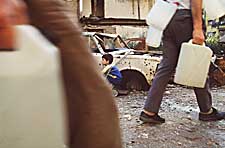
The people of Yugoslavia were Europeans. They were educated and had
similar values to mine. They had CD players and VCRs. Their living room
looked like mine. It didn't matter whether they were Serb, Croat or
Muslim. For the most part the civilians of the war were trying to live
day by day. I tried to photograph the forces that were taking over
their lives. They quickly became engulfed in a whirlwind of civil war
which no one could control.
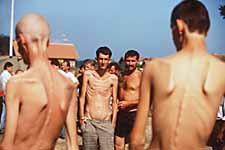
I felt a connection to this difficult and dangerous place. It wasn't a
place I loved to be at. At times it was almost as if I was in
W.W.II. Battles were fought in the same
place as 40 years ago. The sad part was that the battles and the lines
were also the same. No one had learned anything. History and the
future were more important than the present.
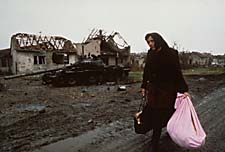 I had seen
the war start and I wanted to see it end. Originally my work was intended as news photographs. The intent was to bring
attention to the situation, to help people reach decisions in order to
bring about change. Unfortunately change never really occurred. Today I hope
the work stands as part of a document of the war. It is an accusation
to those who saw yet stood by and did nothing until thousands had died
and millions became refugees.
I had seen
the war start and I wanted to see it end. Originally my work was intended as news photographs. The intent was to bring
attention to the situation, to help people reach decisions in order to
bring about change. Unfortunately change never really occurred. Today I hope
the work stands as part of a document of the war. It is an accusation
to those who saw yet stood by and did nothing until thousands had died
and millions became refugees.
[Opening image: This
defaced photograph was the only item remaining, when the daughter of this Muslim family returned to her home, which had been occupied by a Serb family during the war.]
![]()
 PHOTOARTS|
PHOTOARTS|